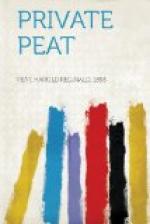Peter had been in the Suffolks. A lieutenant in the Imperial Army. Money was scarce and he threw up his commission. He tried Canada as a fortune making ground. Lingered a while in Calgary, and when war broke out enlisted in the now famous Fighting Tenth.
Peter came up from Salisbury to see us. He met me in town a few times. We lunched, dined, did a theater. He brought pals with him. There was Sandy Clark. Poor old Sandy! I have his collar badge C10. Another soldier took it off his tunic for me before they buried him. A sniper got Sandy in June, 1916.
There was Farmer. He was a signaler, and was transferred. I saw his name listed killed, too. I don’t know where. There were half a dozen other Canadian boys, Peter and myself. We lunched one day at Pinoli’s in Rupert Street. We pledged to our next meeting after the war at the same place. We shan’t meet at Pinoli’s. There is none of the boys alive. I only live of all the party. It was a strange thing that day. I did not know it would be the last time I should see Peter, but he came back from down the street and kissed me “good-by” a second time. I wondered. Old man Peter.
The war has come home to our family. There is none of us left. Tom Small, my step-brother, is still living and still fighting. I pray his safety to the end. They all went, one after the other. The last to go was Hugh. July, 1916, on the eleventh day he was killed. Dear old boy, it is unrealizeable yet. You won the military Cross and you won yet another undying honor. You were sniped in the glory of completing a fine piece of work. Your six feet of glorious young manhood lie deep in French soil. Good-by, Hugh!
Peter was reported missing. All of us who were left alive tried every means of which we knew and of which we heard to find a trace of him. We got none. At last I decided that an advertisement in a daily paper would bring replies from wounded soldiers. I advertised in The Daily Express. The advertisement appeared on a Wednesday, and on the Thursday morning I had a letter from a young Canadian soldier of the Third Battalion who was in the Royal Herbert Hospital at Woolwich. He told me of knowing something of what may have happened to Peter. The possibilities were that he was blown up in company with a trench full of other soldiers. There is little reason to doubt this awful ending to a young life; there is no evidence of anything else.
The letter of the young Canadian soldier was kindly and frank in tone. I answered it, and asked if he had any relations in the Old Country. He replied that he had not, and we decided that we would go and see him in hospital and try in some way to help him in his loneliness.
[Illustration: (C)_Famous Players—Lasky Corporation. Scene from the Photo-Play_
“THEY LOOK BIG ENOUGH, DON’T THEY?”]
[Illustration: A close shave in Flanders]
Before seeing the soldier I received several other letters, notably from Sam J. Peters, who came to see us, and was positive that he knew Peter as a man who had aided him on his being wounded himself. Lance-Corporal Carey was another who wrote, and Corporal George A. Vowel, known as Black Jack, then of the Tenth and now of the Thirteenth Machine Gun Corps, wrote a kindly letter.




